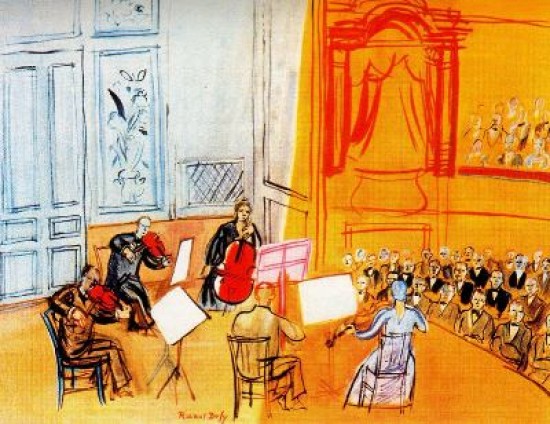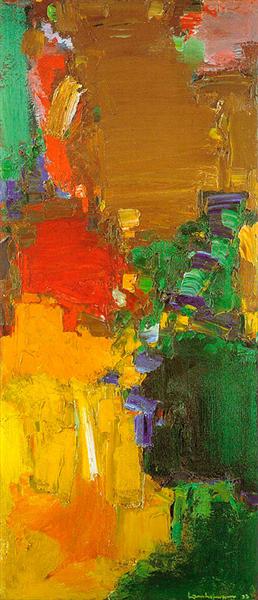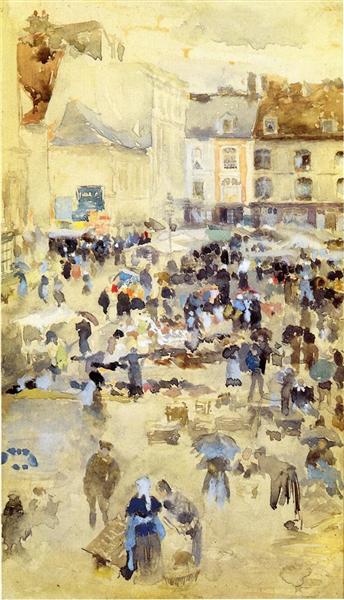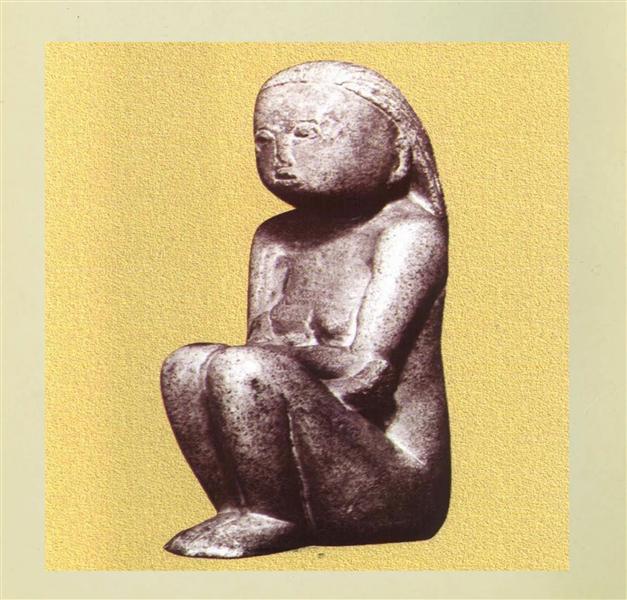Just another WordPress.com weblog
Month: December, 2023

_____
if a trio is a sonata written for three instruments,
a sonata, a piece of music consisting of more
than one segment, or movement, written for
four instruments, is called a quartet
a quartet is also what we call the group itself
of four players
quartets can play more than just quartets, they
can also play waltzes, nocturnes, rhapsodies,
for instance, just as trios, groups of three, can
play more than just trios
but quartets, the form, have had a long and
glorious history, from Mozart and Haydn,
the Classicists, through Beethoven, an
ardent Romantic, to the more political
Shostakovich, enemy, for a time, of his
repressive Soviet state, and on to
Messiaen, who composed his own
concentration camp
let me start with the Messiaen, now that I’ve
whetted your appetite, and work our way back
to Mozart to see where we came from, and
how
there are seven movements in Quartet for
four, atonality abounds, discordant, not
unexpectedly, progressions, repetition also
takes its punches, not easily identifiable
throughout, but tempo, the third pillar of
Western music, more or less holds its
own, keeping the tradition, however
precariously, together, listen
it’s 1941, we’re in a concentration camp,
Messiaen is caught between hope and
despair, give the guy a break, he hasn’t
many absolutes to hold onto, tempo
might be one of them, the heartbeat,
pulse, perseverance, an actual human
pace, a rhythmic instinct, by which
eventually, hopefully, meaning
transpires
hope is in one’s creativity, he says, each
individual answer can be a tribute to
one’s own tribulations, our responses
can be poetry, lessons rather than
invectives, epiphanies rather than
agonies, may the Force, in other words,
be with you, in the face of even the most
trying difficulties, honour can supplant
trials, he concludes, given grace and
integrity
Beethoven says pretty much the same
corroboration
R ! chard

“Rhapsody“ (1958)
________
before putting variations aside, if only
for the moment, let me explain why
this piece, an essential component
in the history of the form in our
Western Classical musical culture,
is not called variations
let me get into it
a set of variations, but even more
so, it’s a concerto, for piano and
orchestra
what’s a concerto, a concerto is a
sonata, a piece of music consisting
of more than one segment, movement,
but written for a full orchestra, and one
central soloist
Rachmaninov has therefore combined
two musical forms, variations and the
concerto, but eliminated the pauses
between the movements, thereby
blocking his path to calling his work
a concerto, which requires identifiable
separate movements
with variations, Rachmaninov asserts
the significance of repetition in our
Western Classical musical structure,
each variation returns us to its source,
making manifest repetition, tradition,
ritual, as primary, as essential to
community, to one-on-one trust
but each variation allows also for a
difference in tempo, another essential
element of the Classical architecture,
these two aspects are therefore in
something of a conflict
tonality, the third essential component
of Classical music, remains essentially
untouched, there are no discordant
episodes
this will happen, but only later
R ! chard

___________
of all the sets of variations, Bach’s Goldbergs
are supreme, they were written, apparently,
harpsichordist of a Russian ambassador to
the electoral court of Saxony, who often
sojourned in Leipzig, one of Bach’s home
fronts, to help him help the count, his
master, however paradoxically, sleep
Glenn Gould made them famous, again, in
1955, for my generation, electrifying the
world with his clinical, rather than
Romantic, interpretation, became, thereby,
a guiding light for me, a metaphysical
mentor, and inspiration
he closed the chapter of his musical
career in 1981, with the same piece
all over again, revisited it, and once
more made musical history, listen
there is no alteration of volume in the
Goldbergs, the harpsichord hadn’t
developed into the piano yet, the
notes fall, however rhythmically
indiscriminately, in a monotone, like
water tinkling from a fountain, soporific
eventually, inducing sleep, like clocks
ticking, or bells ringing from church
steeples, as in every quarter hour
in nearly every European setting,
to help counts, and everyone else
in the vicinity, sleep
R ! chard

______
since I brought up variations in my last instalment,
pieces of music that elaborate on a principal theme,
develop it, transform it, into a variety of moods
and melodic directions, for entertainment, but also,
from the pens of the most fervent composers,
metaphysical edification, I returned, nearly
instinctively, to two sets of variations that changed
my life, became polestars of my moral universe,
for their pursuit of beauty and, consequently,
meaning
I’ll bring one of them up here only, save the other
for its own particular moment, Glenn Gould, a titan
of the Twentieth Century Classical music scene,
extraordinary performance, but a wizardry, the
enchantment, of a poet, a very prophet, an
looking-glass, you come out, with him, a
different person
R ! chard

_____________
a trio is a group of three instrumentalists,
most often a piano, a violin, and a cello,
in our Western musical tradition
but it is also a musical form, like a waltz
is, or a prelude, or a nocturne, a trio is
a sonata, essentially, but written for
three instruments, not one, nor two,
consisting of more than one segment,
or movement
though I’ve presented trios as trios to date,
sonatas for three instruments, here’s a piece
for three instruments but in one movement,
though segmented, admittedly, as variations,
see above, a similar collection of rhythms
and styles, brought together by a common
essential element, a game audiences played
back then, and still do even now, trying to
distinguish the individual variations, before
falling prey to their enchantment
R ! chard
_________
the best way to sharpen your aesthetic pencil
is always to put one thing up against another,
then decide which you like best, the outcome
is never right or wrong, it is quite simply a
function of your aesthetic sensibility, the
more you exercise that taste muscle, holding
one element up against another, to compare,
the more you develop an informed, if not ever
conclusive, opinion, which develops eventually
into, if not authority, at least wisdom
what do you want to be when you grow up,
I asked myself in my very early teens, I
want to be wise like my grandmother, I
answered, have I reached my goal, you
tell me, though it is still, and ever will be,
my quest
Beethoven’s “Archduke“, also a trio, his
which do you like best, there is no correct
answer, but your choice will tell you a lot
about yourself
enjoy
R ! chard

“Trio“ (c.1936)
______
November, 2023, but I still abide by the
belief that a sonata a day keeps the
doctor away, so I’ve continued, more
or less, my medicine
but a sonata exceeds its definition, a
piece of music, consisting of more
than one segment, called movement,
for one or two instruments, the second,
should it be included, being harmony
for an instrument that can play only
one note at a time, which is to say,
everything except the piano
but a piece of music written for three,
instead of just one or two, instruments
is also called a trio
a work consisting of more than one
movement, but performed by three,
instead of just one or two, usually
different, instruments, is as well
called a trio, just to confuse you
here’s one, for violin, cello, and piano,
by César Franck, a Romantic composer,
I didn’t expect much, it being, manifestly,
his first composition, Opus 1, No. 1, but it
was part of the program I got tickets for
coming up at our recital society here in
February, I had to investigate
to my surprise, it was, is, magical
R ! chard






